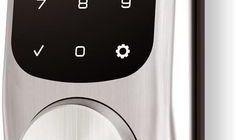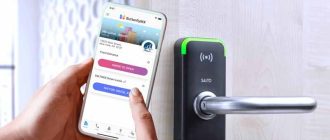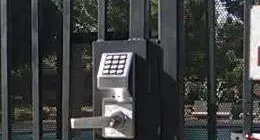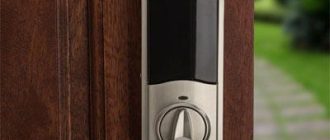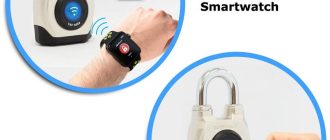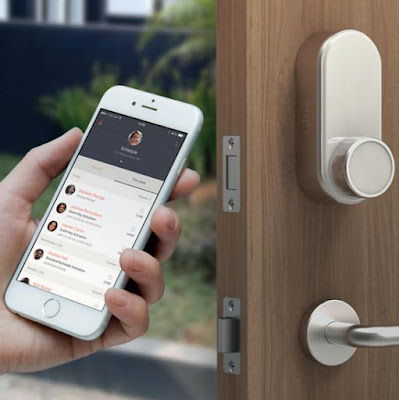
Are Smart Locks Secure
As technology advances, our homes have become smarter, enhancing our convenience and security. Smart locks are one such innovation that promises to offer a more convenient and secure way to protect our homes.
Smart locks are electronic locks that can be controlled through a mobile app or a key fob. They eliminate the need for traditional keys and provide additional features such as remote locking and unlocking, as well as integration with other smart devices in your home.
While the idea of using a smartphone or a key fob to lock and unlock your door sounds appealing, there are concerns about the security of these smart locks. One of the main concerns is the potential for hackers to gain access to your home by exploiting vulnerabilities in the smart lock system.
However, manufacturers of smart locks claim that their products are just as secure as traditional locks, if not more. They argue that smart locks use advanced encryption algorithms and other security measures to protect against hacking attempts.
So, are smart locks really secure? The answer is not straightforward. While they offer convenience and additional features, they also come with potential security risks. In this article, we will explore the pros and cons of smart lock technology and help you make an informed decision.
Are Smart Locks Secure?
Smart locks have gained popularity in recent years due to their convenience and ease of use. However, many people have concerns about the security of these locks.
While smart locks offer advanced features such as remote access and the ability to grant temporary access to others, there is always a risk of security vulnerabilities. Hackers may find ways to exploit these vulnerabilities and gain unauthorized access to your home or property.
However, it is important to note that traditional locks are not immune to security risks either. Lock picking and key duplications are common methods of bypassing traditional locks.
Smart lock manufacturers understand the importance of security and continuously work to improve their products. They implement encryption protocols and other security measures to protect against unauthorized access.
It is also worth mentioning that using strong passwords and regularly updating the firmware of your smart lock can significantly increase its security.
In conclusion, while smart locks may have some security risks, they also offer enhanced security features compared to traditional locks. With proper precautions and regular updates, smart locks can provide a secure and convenient way to protect your home or property.
Advantages of Smart Lock Technology
Smart lock technology offers a variety of benefits when it comes to home security. Here are some advantages of using smart locks:
1. Enhanced Security:
Smart locks provide an added layer of security to homes. By using modern authentication methods such as passwords, fingerprints, or even facial recognition, smart locks make it difficult for unauthorized individuals to gain access to your property.
2. Convenience:
One of the major advantages of smart locks is the convenience they offer. With a smart lock, you no longer need to carry around a physical key or worry about losing it. Instead, you can use your smartphone or a keyless entry code to unlock the door, making it easier and quicker to enter your home.
3. Remote Access:
Smart locks allow you to remotely control and monitor your locks from anywhere, as long as you have an internet connection. This means you can lock or unlock your doors when you’re not at home, grant temporary access to guests, or receive real-time notifications whenever someone enters or exits your home.
4. Integration with Smart Home Systems:
Smart locks can be integrated with other smart home devices, such as security cameras, alarms, and voice assistants. This allows you to create a comprehensive home security system that can be controlled and managed from a single platform.
5. Activity Log:
Many smart locks have a built-in activity log that keeps a record of who enters and leaves your home and at what time. This can be helpful for keeping track of any suspicious activity or simply monitoring the comings and goings of family members and visitors.
While there are certainly advantages to using smart lock technology, it is important to consider the potential drawbacks and make an informed decision based on your specific security needs.
Enhanced Convenience and Accessibility
One of the main benefits of smart locks is the enhanced convenience and accessibility they offer. With smart locks, you no longer need to carry around keys or worry about losing them. Instead, you can unlock your door with just a few taps on your smartphone or a spoken command to a voice assistant.
Smart locks can also provide added convenience when it comes to granting access to your home. For example, you can remotely unlock the door for a guest or service provider, even if you’re not at home. This eliminates the need to hide spare keys or be physically present to let someone in.
In addition, smart locks often come with features that enhance accessibility for individuals with disabilities or mobility issues. For example, some smart locks can be operated using a keypad or a fingerprint scanner, making it easier for those with limited mobility to enter their homes.
However, it’s important to note that while smart locks offer convenience and accessibility benefits, they also come with potential security risks. It’s crucial to carefully consider the pros and cons before deciding whether to implement smart lock technology in your home.
Integration with Smart Home Systems
One of the major advantages of smart locks is their ability to seamlessly integrate with smart home systems. This integration allows homeowners to control their locks remotely through their smart devices, such as smartphones or tablets. By connecting the smart lock to a smart home system, users can also automate the locking and unlocking of their doors based on certain conditions, such as time of day or whether they are at home or not.
Smart home systems provide an additional layer of convenience and security to smart locks. For example, users can set up their smart lock to automatically lock their doors when they leave the house or unlock them when they arrive home. This eliminates the need to carry keys and reduces the risk of forgetting to lock the doors. Additionally, users can receive real-time notifications on their smart devices when someone locks or unlocks their doors, providing them with peace of mind and the ability to monitor who is accessing their home.
The integration of smart locks with smart home systems also allows for greater control and customization. Users can create unique access codes for different individuals, such as family members, friends, or service providers, and easily grant or revoke access as needed. This eliminates the need for physical keys and reduces the risk of lost or stolen keys falling into the wrong hands.
| – Remote control of lock | – Potential security vulnerabilities |
| – Automation of locking and unlocking | – Dependence on smart home system |
| – Real-time notifications | – Compatibility issues with non-smart devices |
| – Customizable access codes |
Keyless Entry
One of the main benefits of smart locks is their keyless entry feature. With traditional locks, you need a physical key to unlock and lock the door. This can be cumbersome, especially if you have multiple keys for different locks.
Smart locks eliminate the need for keys and instead allow you to access your home using a smartphone or other authorized devices. This provides convenience and flexibility, as you no longer have to worry about carrying around keys or losing them. You can simply use your smartphone to unlock the door with a tap or even have it automatically unlock when you approach.
Keyless entry also allows for easy and secure sharing of access with others. You can grant temporary or permanent access to friends, family members, or service providers, without having to worry about making and distributing physical keys. This can be especially useful for Airbnb hosts or landlords who need to manage access for different tenants.
However, it’s important to note that keyless entry can also introduce new security risks. Since smart locks rely on wireless technology, there is always a possibility of hacking or unauthorized access. It’s crucial to use strong, unique passwords and regularly update your lock’s firmware to minimize these risks.
Overall, keyless entry offered by smart locks provides convenience and flexibility, but it’s important to be cautious and take necessary precautions to ensure the security of your home.
Remote Access Control
One of the key advantages of smart locks is the ability to control and monitor access to your home remotely. With remote access control, you can lock and unlock your door from anywhere using a smartphone or internet-connected device. This convenience can be especially useful if you need to grant temporary access to someone while you’re away or if you forget to lock your door and want to do so remotely.
However, with this convenience comes concerns about security. While smart locks have advanced security features, such as encryption and two-factor authentication, they are still susceptible to hacking and unauthorized access. Hackers could potentially exploit vulnerabilities in the lock’s software or gain access to your smartphone or device to control your lock. It’s important to choose a smart lock that has strong security measures in place to protect against these risks.
Another consideration is the reliability of the remote access control feature. In order for remote access to work, your smart lock needs to be connected to the internet. If your internet connection is unreliable or goes down, you may not be able to control your lock remotely. This could be a significant drawback if you’re relying on remote access for security purposes.
Overall, remote access control offers convenient and secure ways to manage access to your home. However, it’s important to choose a smart lock that prioritizes security and reliability to minimize the risks associated with remote access control.
Activity Monitoring
One of the key features of smart locks is activity monitoring. This technology allows homeowners to keep track of who is entering and exiting their homes at all times. The secure nature of smart locks means that homeowners can have peace of mind knowing that their homes are protected.
With activity monitoring, homeowners can receive real-time notifications when someone enters or exits the house. This feature is especially useful for those who frequently have guests or service providers entering their home. Homeowners can also view a log of all activity, including dates and times of entry and exit.
Activity monitoring can be a valuable tool for improving home security. If suspicious activity is detected, homeowners can take immediate action, such as contacting the authorities or remotely locking the doors. This technology can also help deter burglars, as they are more likely to avoid homes with visible smart lock systems.
However, there are some concerns with activity monitoring. Some may feel that constant surveillance infringes on privacy rights. Homeowners may also be overwhelmed with the amount of data collected by the smart lock system and may struggle to effectively analyze and interpret the information.
Ultimately, the benefits of activity monitoring outweigh the potential drawbacks for many homeowners. The secure nature of smart locks, combined with real-time notifications and access logs, provide peace of mind and enhanced home security.
Temporary Access Codes
One of the features that make smart locks secure and convenient is the ability to create temporary access codes. These codes allow homeowners to grant limited-time access to their property to visitors or service providers without the need for physical keys.
The use of temporary access codes offers several advantages. Firstly, it eliminates the need to share physical keys, which can easily get lost or fall into the wrong hands. Instead, homeowners can generate a unique access code and send it to the person who needs temporary access. This minimizes the risk of unauthorized entry and provides homeowners with better control over who has access to their property.
Furthermore, temporary access codes can be set to expire after a specified period of time. This means that even if someone manages to obtain the code, they will not be able to use it to gain access once it has expired. This feature enhances security and adds an extra layer of protection.
In addition, smart locks also offer the flexibility to create multiple temporary access codes. Homeowners can assign different codes to different people or groups, allowing them to track who enters their property at specific times. This can be particularly useful for Airbnb hosts or those who frequently have guests staying at their home.
However, it is important to note that the security of temporary access codes relies on homeowners being vigilant in managing and protecting their codes. If codes are not regularly changed or if they are shared carelessly, the security of the smart lock system can be compromised. Therefore, it is crucial for homeowners to understand the importance of strong access code management and to follow best practices for ensuring the security of their temporary access codes.
Increased Security Features
One of the main advantages of smart locks is their ability to provide increased security compared to traditional locks. Smart locks often include advanced features that make them more secure and less vulnerable to break-ins.
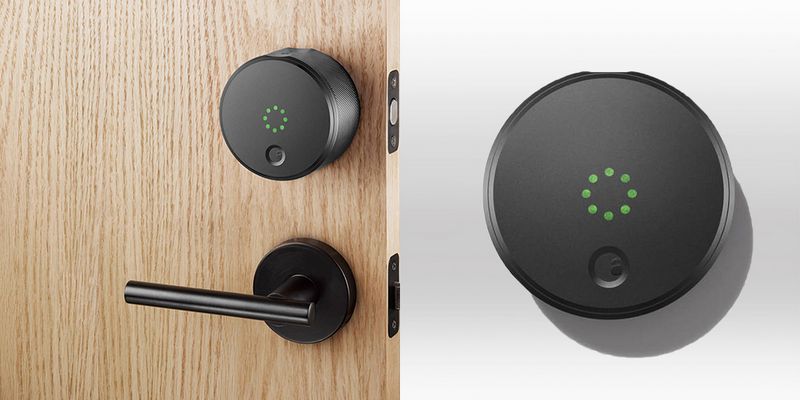
Firstly, smart locks use encryption technology to protect the communication between the lock and the mobile device or keypad used to control it. This ensures that the communication is secure and cannot be easily intercepted or tampered with.
Secondly, smart locks often have built-in tamper detection and alarm systems. If someone tries to tamper with or forcefully break the lock, an alarm will be triggered, alerting the homeowner or security personnel to the attempted break-in.
Some smart locks also have integrated cameras or video doorbells that allow homeowners to see who is at their door and communicate with them remotely. This added feature provides an extra layer of security and allows homeowners to verify the identity of visitors before granting them access.
In addition, smart locks can provide activity logs, showing a record of all lock events and user activity. This can be useful for monitoring who comes and goes from a property and can assist in investigations in the event of a security breach.
While traditional locks can be easily picked or bypassed, smart locks provide a higher level of security due to these advanced features. However, it is important to note that no security measure is foolproof, and vulnerabilities can still exist with smart lock technology.
Overall, the increased security features of smart locks make them a popular choice for those looking to enhance the protection of their homes or properties.
Disadvantages of Smart Lock Technology
While smart lock technology offers convenience and enhanced security features, there are also some disadvantages to consider. Here are a few:
| 1. Vulnerability to hacking | As with any internet-connected device, smart locks can be vulnerable to hacking. Hackers may exploit vulnerabilities in the lock’s software or network connection to gain unauthorized access. |
| 2. Dependence on power and internet | Smart locks rely on power and internet connectivity to function properly. In the event of a power outage or internet downtime, you may not be able to unlock or lock your door using the smart lock. |
| 3. Compatibility issues | Smart locks may not be compatible with all door types or existing lock systems. This can limit your options when it comes to installing or upgrading to a smart lock. |
| 4. Malfunctioning or technical glitches | Like any electronic device, smart locks are prone to malfunctioning or experiencing technical glitches. This can result in issues with locking or unlocking the door, causing inconvenience and frustration. |
| 5. Higher cost | Compared to traditional locks, smart locks tend to be more expensive. The initial cost of purchasing and installing a smart lock, as well as any ongoing maintenance or upgrades, can be a significant financial investment. |
When considering whether to invest in smart lock technology, it is important to weigh the advantages against these disadvantages to make an informed decision that meets your needs and security preferences.
Vulnerability to Hacking
While smart locks offer convenience and enhanced security features, they are not entirely immune to vulnerabilities. One major concern with smart locks is their susceptibility to hacking.
Smart locks rely on wireless communication protocols, such as Bluetooth or Wi-Fi, to connect with other devices, like smartphones or home automation systems. This connectivity introduces potential entry points for hackers to exploit.
One common method of hacking smart locks is through brute force attacks. Hackers can attempt to gain access by systematically trying different combinations to break the lock. This can be facilitated by weak passcodes or password sharing.
Additionally, smart locks can also be vulnerable to password cracking, where hackers use advanced software to decipher passwords or passcodes. If a user’s password is not strong enough or is easily guessable, it can increase the risk of unauthorized access.
Another concern is the potential for unauthorized remote access. If a smart lock’s software is not properly secured, hackers could potentially gain control over the lock and manipulate it remotely. This could lead to unauthorized entry or even physical security breaches.
To mitigate these risks, manufacturers and users need to take measures to enhance the security of smart locks. This includes using strong and unique passwords, updating firmware regularly, and ensuring that the lock is connected to a secure network.
Overall, while smart locks offer convenience and improved security features, it is important to be aware of their vulnerability to hacking. By being proactive and implementing good security practices, users can minimize the risks associated with using smart locks and maximize their benefits.
Power Outages and Failures
One potential drawback of smart locks is their vulnerability to power outages and failures. Unlike traditional locks that do not rely on electricity to function, smart locks require power to operate. If there is a power outage, the smart lock may become temporarily or even permanently unusable, depending on the specific model.
During a power outage, the smart lock may lose its connection to the internet, which can prevent remote access or control of the lock. This means that if you are away from home and rely on your smartphone to unlock or lock your door, you may be unable to do so during a power outage.
In addition, some smart locks have backup batteries that can provide temporary power during an outage. However, these batteries can eventually run out, especially if the power is not restored for an extended period. Once the backup battery is depleted, the smart lock may cease to function until power is restored or the battery is replaced.
Furthermore, power failures can also lead to other issues with smart locks. For example, if the smart lock is connected to other smart devices or a home automation system, a power outage could disrupt the entire system. This means that even if you have alternative methods of accessing your home, such as a physical key, you may still be unable to control other smart devices connected to the lock.
It is important to consider these potential limitations and drawbacks when deciding whether to install smart locks. While smart locks offer convenience and enhanced security features, their reliance on electricity makes them susceptible to power outages and failures.
However, it is worth noting that some smart locks come with additional features such as physical key access or keypads that can still be used during power outages. These alternative methods of access can provide a backup solution in case of a power failure.
In conclusion, while smart locks bring many benefits, it is important to be aware of their limitations and vulnerabilities to power outages and failures. It is crucial to choose a smart lock model that offers backup solutions or alternative access methods to mitigate the risks associated with power interruptions.
Compatibility Issues
One of the potential drawbacks of smart locks is the issue of compatibility. Since there are many different brands and models of smart locks on the market, not all of them may be compatible with each other. This can be a significant concern for consumers who want to integrate their smart lock into a larger smart home system or who may want to switch brands in the future.
For example, if a homeowner purchases a smart lock from one brand, they may find that it is not compatible with their existing smart home devices or the platform they are using to control their smart home. This can lead to frustration and the need to invest in additional equipment or even replace the smart lock altogether, making it a costly endeavor.
Another issue related to compatibility is the need for regular software updates. Smart locks rely on firmware to function properly, and if the manufacturer stops providing updates or the homeowner fails to install them, it can leave the smart lock vulnerable to security breaches. This can be a serious concern, as hackers are constantly looking for vulnerabilities in smart devices to exploit.
To mitigate these compatibility issues, it is important for consumers to thoroughly research and choose smart locks that are known for their compatibility and longevity in terms of software support. Additionally, it is advisable to invest in a smart home hub or platform that offers compatibility with a wide range of devices, ensuring that the smart lock will work seamlessly with other components of the smart home system.
- Selecting a smart lock from a reputable brand that has a track record of compatibility is crucial.
- Regularly updating the firmware of the smart lock is essential to ensure optimal security.
- Investing in a smart home hub or platform that supports a variety of devices can help overcome compatibility issues.
Overall, while smart locks offer convenience and additional security features, compatibility issues need to be carefully considered before investing in this technology.
Reliance on Batteries
One of the potential drawbacks of smart locks is their reliance on batteries for power. Unlike traditional locks that rely on mechanical mechanisms, smart locks require batteries to function. This can be a concern for some users, as it introduces the risk of the lock running out of power and becoming insecure.
While smart locks typically come with battery life indicators that alert users when the battery is running low, there is still the possibility of forgetting to replace the batteries in a timely manner. In such cases, the lock may become temporarily non-functional, leaving the user without a secure means of entry or potentially locking them out of their own home or property.
However, it’s worth noting that many smart locks offer alternative methods of entry in the event of a dead battery, such as a physical key or a backup power source. Some smart locks also have features that allow them to conserve battery life, such as low power consumption modes or automatic lock/unlock based on proximity sensors.
Despite these measures, the reliance on batteries remains a potential weakness of smart locks. Users must ensure that they regularly monitor battery levels, have spare batteries on hand, or consider investing in locks that offer additional backup options to minimize the risk of being locked out or compromising security.
In conclusion, while the reliance on batteries introduces some potential vulnerabilities, the security features and convenience offered by smart locks may outweigh these concerns for many users. It’s important to weigh the pros and cons and consider individual needs and preferences when deciding whether or not to adopt smart lock technology.
Cost
One of the biggest considerations when it comes to smart locks is the cost. While these locks offer convenience and security, they also come with a higher price tag compared to traditional locks. The cost of smart locks can vary greatly depending on the brand, style, and features.
On average, a smart lock can range from $100 to $300, with some high-end models priced even higher. In addition to the lock itself, you may also need to factor in the cost of additional hardware or accessories, such as a bridge or hub, which are required for some smart locks to connect with your smartphone or other devices.
It is important to consider your budget and what features are important to you when choosing a smart lock. While the initial cost may be higher, smart locks can offer long-term savings in terms of convenience and security. For example, some smart locks can be integrated with other home automation systems, allowing you to control multiple devices with a single app. This can help save energy and lower utility bills.
Additionally, some insurance companies offer discounts on homeowner’s insurance for properties equipped with smart locks, as they are seen as a secure measure. Be sure to check with your insurance provider to see if you are eligible for any discounts.
Overall, while smart locks may have a higher upfront cost, the added convenience and security features they offer can make them a worthwhile investment for many homeowners.
Q&A:
Are smart locks safe?
Smart locks can provide a high level of security, but like all technology, they also have their vulnerabilities. It’s important to choose a reputable brand and follow best security practices to ensure the safety of your smart lock.
Can smart locks be hacked?
While smart locks can be hacked, it’s not easy for hackers to do so. Most smart locks have multiple layers of security, including encryption and authentication measures. However, it’s always a good idea to stay vigilant and keep your smart lock’s software up to date.
What are the advantages of using smart locks?
Smart locks offer several advantages over traditional locks. They allow for keyless entry, so you don’t have to worry about losing or forgetting your keys. They also enable remote access, so you can lock or unlock your door from anywhere with an internet connection. Additionally, many smart locks have features like activity logs and temporary access codes, which can enhance security and convenience.
Are there any disadvantages to using smart locks?
Like any technology, smart locks have their drawbacks. They can be more expensive than traditional locks, and they require batteries, which need to be replaced periodically. There is also the potential for hacking or technological malfunctions, which could leave your home vulnerable. Additionally, some people may prefer the simplicity and reliability of traditional locks.
What should I do if my smart lock malfunctions?
If your smart lock malfunctions, the first step is to check the batteries and ensure that they are properly installed. If the issue persists, you may need to reset the lock or contact customer support for further assistance. It’s always a good idea to have a backup plan, such as a spare key or a traditional lock, in case of emergencies.
Do smart locks provide better security than traditional locks?
While smart locks offer some advanced security features like fingerprint recognition and remote monitoring, they also come with their own vulnerabilities. It’s important to carefully consider the pros and cons before deciding to use a smart lock.
What are the main advantages of using smart locks?
Smart locks offer convenience and flexibility. They allow you to remotely lock or unlock your door, provide temporary access to guests, and monitor who enters your home. Some smart locks even integrate with other smart home devices to create a seamless automated system.

